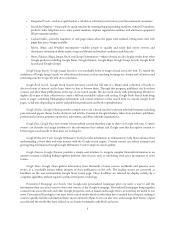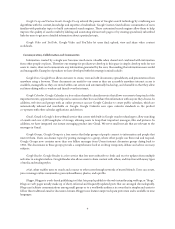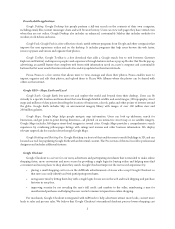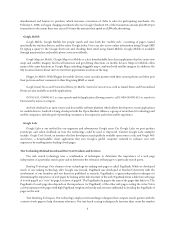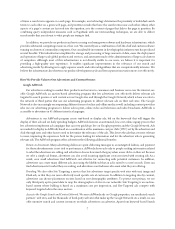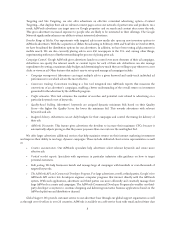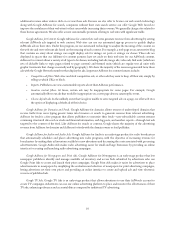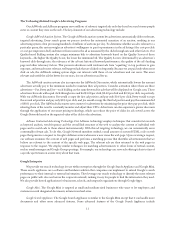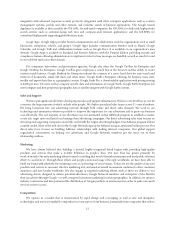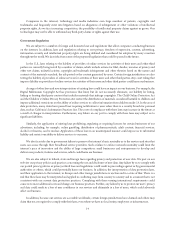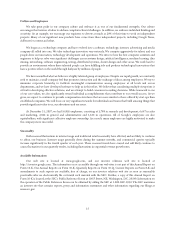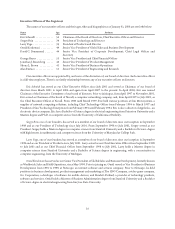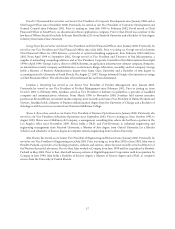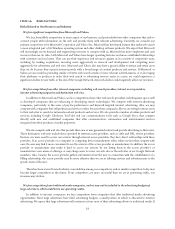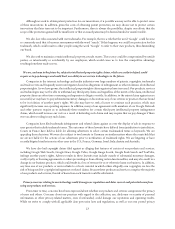Google 2007 Annual Report Download - page 27
Download and view the complete annual report
Please find page 27 of the 2007 Google annual report below. You can navigate through the pages in the report by either clicking on the pages listed below, or by using the keyword search tool below to find specific information within the annual report.connect people with information on the web and provide them with relevant advertising. Currently, we consider our
primary competitors to be Microsoft and Yahoo.
We also face competition from other web search providers, including start-ups as well as developed companies that
are enhancing or developing search technologies. We compete with internet advertising companies, particularly in the
areas of pay-for-performance and keyword-targeted internet advertising. We may compete with companies that sell
products and services online because these companies, like us, are trying to attract users to their web sites to search for
information about products and services. In addition to internet companies, we face competition from companies that
offer traditional media advertising opportunities. We also provide a number of online products and services, including
Google Checkout, YouTube and our communications tools such as Google Docs, that compete directly with new and
established companies that offer communication, information and entertainment services integrated into their products or
media properties. We also compete with web sites that provide their own or user-generated content and seek to provide
advertising to their users.
We compete to attract and retain relationships with users, advertisers and Google Network members and other
content providers in different ways:
•Users. We compete to attract and retain users of our search and communication products and services. Most of
the products and services we offer to users are free, so we do not compete on price. Instead, we compete in this
area on the basis of the relevance and usefulness of our search results and the features, availability and ease of use
of our products and services.
•Advertisers. We compete to attract and retain advertisers. We compete in this area principally on the basis of the
return on investment realized by advertisers using our AdWords and AdSense programs. We also compete based
on the quality of customer service, features and ease of use of our products and services.
•Google Network members and other content providers. We compete to attract and retain content providers (Google
Network members, as well as other content providers for whom we distribute or license their content) primarily
based on the size and quality of our advertiser base, our ability to help these partners generate revenues from
advertising and the terms of the agreements.
Intellectual Property
We rely on a combination of patent, trademark, copyright and trade secret laws in the U.S. and other jurisdictions as
well as confidentiality procedures and contractual provisions to protect our proprietary technology and our brand. We also
enter into confidentiality and invention assignment agreements with our employees and consultants and confidentiality
agreements with other third parties, and we rigorously control access to proprietary technology.
Google, AdSense, AdWords, Gmail, I’m Feeling Lucky, PageRank, Blogger, orkut, Picasa and Keyhole are registered
trademarks in the U.S. Our unregistered trademarks include, Blog*Spot, Writely and YouTube.
The first version of the PageRank technology was created while Larry and Sergey attended Stanford University,
which owns a patent to PageRank. The PageRank patent expires in 2017. We hold a perpetual license to this patent. In
October 2003, we extended our exclusivity period to this patent through 2011, at which point our license will become
non-exclusive.
Circumstances outside our control could pose a threat to our intellectual property rights. For example, effective
intellectual property protection may not be available in every country in which our products and services are distributed.
Also, the efforts we have taken to protect our proprietary rights may not be sufficient or effective. Any significant
impairment of our intellectual property rights could harm our business or our ability to compete. Also, protecting our
intellectual property rights is costly and time consuming. Any increase in the unauthorized use of our intellectual property
could make it more expensive to do business and harm our operating results.
13


